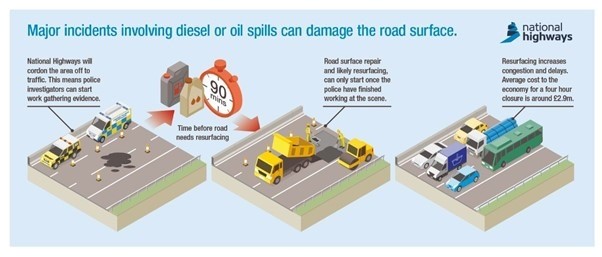National Highways is analysing the results of a £270,000 trial to find new ways to treat spillages on England’s strategic road network without destroying vital evidence.
The trial was funded through the National Highways Innovations Designated Funds programme and incorporates techniques in a ‘real-world’ testing environment.

A 200-metre trial area at Santa Pod Raceway was used for the testing phase, which employed forensic evidence such as tyre marks and debris - usually found on the road following a major incident – alongside diesel and oil samples.
'Specialists tested fluid-based treatments to see if they could absorb the spillages without destroying the evidence at the same location,' National Highways said, adding that the results from the forensic examinations will now be analysed to shape the next steps.
When a major incident happens, essential police investigations involving detailed forensic work are often required. While these examinations are taking place, there is limited access for highways teams to treat the spillages.
It can take just 90 minutes for oil and diesel to damage the road surface and require resurfacing works to take place.
National Highways' on-road service delivery manager, Sian Norman, said: 'The forensic testing process was very valuable, and we were able to test a range of products to see how they performed in a real-world scenario.
'Whenever there is a serious incident on the network, we know that police investigation work is vitally important, but we must manage that aspect against getting traffic moving again and alleviating congestion. The results of the tests will now be analysed over the coming weeks and will help to shape the next steps.'
National Highways joined forces with the Forensic Collision Investigation Network (FCIN) and Kier Highways for the trial.
Its Designated Funds programme is divided into four funding streams aimed at making the biggest difference and delivering lasting benefits; environment and wellbeing, users and community, safety and congestion and innovation and modernisation.
Other achievements include 124 biodiversity initiatives, 150 safety improvements on single carriageway roads to reduce the number of people killed or seriously injured and over 6,500 lights and traffic signals converted to LED, National Highways said.





